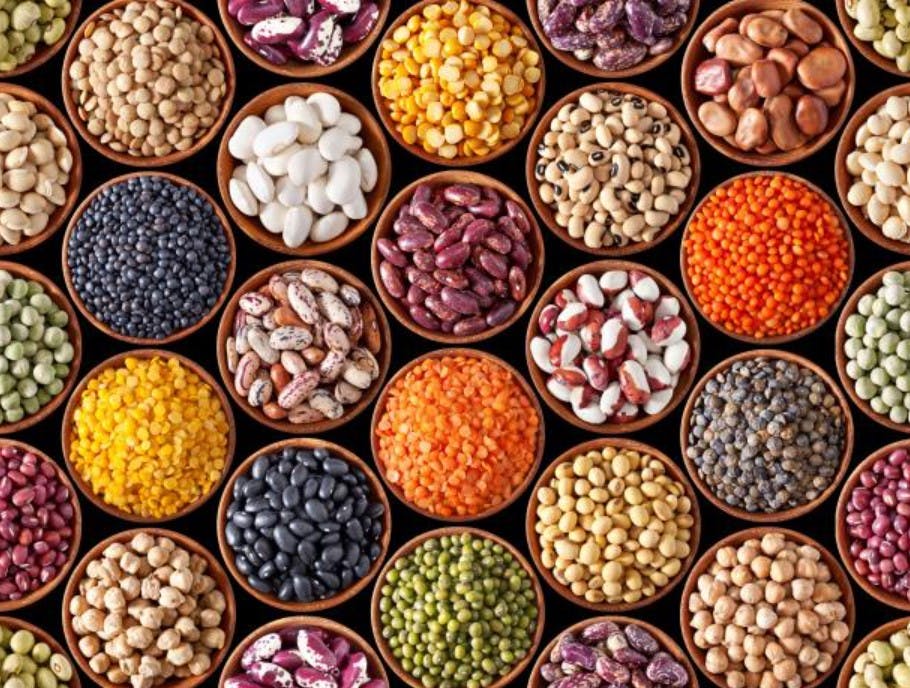Across Alberta, there are several other pulse processing plants currently in development.
What are Pulses?
Pulses are edible seeds from the legume family, including beans (pinto, red, yellow, and black), peas, lupins, chickpeas, soybeans, and lentils. They are naturally high in protein and dietary fibre and low in fat. The pea crop is also environmentally friendly, capturing nitrogen from the air reducing the demand (and cost) of chemical fertilizers.
Learn more about RDAR research into lupins in Alberta.
Moving toward value-added manufacturing
Canada is the world’s largest exporter of pulse crops and world’s largest producer and exporter of peas and lentils to the global market. There is potential for the Prairies to become the engine room, producing and processing pulses into high-value ingredients that can then be added to final form food products — feeding consumers in cities across Canada and beyond
Once operational, Alberta’s pulse processing facilities will enable our producers and processors to supply the world with high-quality, safe pulse products such as protein concentrates, flours, meat extenders / meat substitutes, snacks and meals, and pet and livestock feed.
Learn more about RDAR research and development into plant-based proteins to enhance performance of animal feed.
Breaking into the plant-based food market requires Canada to look beyond merely growing and packaging the legumes. With collaboration and targeted investment into the pulse processing industry, the future looks bright for Canada. RDAR, our funding partners and investors are currently supporting research into pulse crop production and value-added manufacturing.
Pulse Demand Rising
Globally, consumers are demanding plant-based food options. The world’s use of pulses for human and animal consumption has increased year-over-year, especially with consumers exploring different protein choices for health, environmental, or economic reasons.
In Canada, studies have found that a growing number of Canadians are self-identifying as “flexitarians,” those who eat more plant-based products for health and environmental reasons. These dietary preference changes coupled with a growing call for more plant-based protein alternatives signal an excellent opportunity for the Canadian pulse industry to fill this ever-increasing demand.
Globally, many developing world populations are moving from low to middle-income status, which correlates to an increase in the global consumption of protein and processed food. To satisfy the enormous impending demand for safe, Canadian-made food products, Canada has the opportunity to ramp up its manufacturing capacity.
What’s more, investors are beginning to see the growing global demand for plant-based protein, and food retailers are starting to provide more shelf space for new protein products.
On the Pulse of Food Security
The pandemic and catastrophic climate events have tested the global supply chain. As it becomes harder to ship agricultural commodities and products around the globe, there is a growing appetite for Canadian-grown pulses to be processed at home and to export our value-added products overseas. Investors and consumers alike realize that there are further benefits of Alberta grown food — enhanced supply security, more consistent quality, and greater price stability.
Pulse Projections for Alberta and beyond
Canadians are looking for more plant-based food alternatives, and they want these products to be made in Canada. This demand for ‘local’ will translate to increased demand for Alberta pulses and an improved bottom line for pulse producers. Also, the reality of having the capacity in Alberta to process pulse crops and convert pulse ingredients into value-added food will generate direct economic benefits throughout the value chain. Soon, producers will have a direct connection to processors and manufacturing facilities to turn their crops into high-value agri-food products and exports.
The commissioning of Alberta’s first pulse large-scale processing plant in 2023 will increase the competitiveness and profitability of our provincial agriculture industry. With this development, we are further improving the agricultural prosperity of our province, a vital component of Alberta’s economic diversification.
